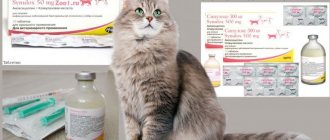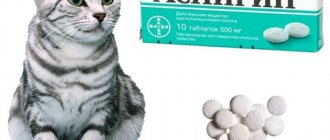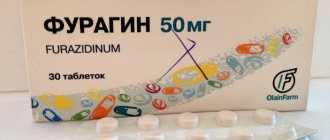Suprastin for dogs in a daily dose of 2 mg/kg is prescribed for allergies with symptoms of skin itching, irritation, swelling, rashes, runny nose and lacrimation after contact with plants, household chemicals, and also due to insect bites. Veterinarians use the drug to prevent allergic reactions to medications and vaccines.
Suprastin in an acute condition (severe swelling, breathing problems) is administered in injections, then switched to tablets, and for prevention and in case of a moderate reaction, the medication is immediately given orally. Injections can be given intravenously in the clinic or intramuscularly and can be given at home in the thigh of the hind leg if necessary. The tablet is crushed and mixed with water or food.
Can a cat be given suprastin for allergies?
Yes, cats can be treated with suprastin. Of course, this medicine is intended for people, it is not a veterinary drug. But still, cats are sometimes treated with its help. It is used as an antihistamine when absolutely necessary. Suprastin (chloropyramine hydrochloride) is given to tailed pets during estrus and allergies as a sedative. In the first case, the animal often experiences pain that changes behavior. The cat begins to either be excessively affectionate, rub against all family members, or become agitated and aggressive. In other words, not entirely adequate behavior is manifested. When it comes to manifestations of allergies, the cat suffers greatly from itchy skin. It causes severe discomfort to the animal, and scratching the skin leads to infection. It is to eliminate such itching that cats are given suprastin.
Let us recall that pharmacies offer this medicine to consumers in two forms: tablets and as an intramuscular solution. Not all pet owners know how to properly give their pets pills if the need arises. It’s also rare for anyone to cope with self-administration of the solution. Suprastin tablets should be given to cats in a strict dosage. Otherwise, poisoning may add to existing problems. And this is dangerous. That is why it is strictly forbidden to exceed the permissible limits, in the belief that this will increase the effectiveness of the medication.
So, you need to carefully crush the tablet so that there are no grains, then make a suspension (mix it with a small amount of water) and insert it into the animal’s mouth. To do this, it is best to use a double syringe, having first removed the needle. The second option is to place a piece of the tablet on the root of the pet’s tongue and force it to swallow. In both the first and second cases, you must be prepared to resist and release your claws.
The reaction to an antihistamine is calmness, sleep, lethargy. This is the norm. Usually cats are not treated with this remedy for more than three days.
Why give Suprastin to a cat?
Suprastin is used during a cat's heat to relieve pain and calm an excited animal. During heat, the animal's mood changes, the cat behaves inappropriately and sometimes shows aggression. Suprastin in this case will have a calming effect on her. However, remember that a large dosage of the drug will have a bad effect on the pet’s well-being.
© shutterstock
The drug is also used when a cat has an allergy. Most often it can be caused by:
- individual feed components. This usually happens when switching to a new brand.
- prohibited products. Remember, you may have recently fed your cat something unusual that triggered an allergic reaction.
- other medications or their individual components.
When using the medicine in both cases, the animal becomes calm, it tends to sleep, and movements may become inhibited. Don't worry if your cat sleeps for a long time - this is the effect of the drug. But remember that you need to follow the dosage of Suprastin to avoid complications.
Analogues of the drug for animals
Instead of Suprastin, you can use Tavegil for your animal, the veterinary drug Allervet in injections to relieve an acute allergic reaction or long-term use. For bronchial asthma, Dexamethasone may be recommended by your veterinarian. In mild cases, it may be enough to give the dog a solution of calcium chloride with milk. Loratadine, Cetrin, Zyrtec have a stronger effect.
How to give Suprastin correctly and in what dosage
The most important rule when using Suprastin for a cat is to select the correct dosage. Increasing the dosage at will will not add to the effectiveness of the drug, but Suprastin in large quantities can cause serious harm to a cat.
The rules of application are as follows:
- the course of treatment lasts 3 days. If you think that this period is not enough, then consult a veterinarian, since independent extension of treatment with Suprastin may be unfavorable for a cat.
- the correct dose of Suprastin is ¼ tablet per 5 kg of animal.
- The tablet is given once a day before bedtime. The tablet is better absorbed with water, so make sure your cat has access to it.
Suprastin is also available in liquid form for injections. If you are not a veterinarian and do not know how to give injections to animals, refrain from this method.
© shutterstock
But when treating a cat with Suprastin tablets, also take precautions, as the animal may choke. Use one of these tips to make this process easier:
- crush the tablet and mix with food;
- wrap the tablet in meat.
Do not try to place it on the back of the tongue so that the cat will automatically swallow it. In such a situation, the animal will show aggression, and the pills will be associated with something unpleasant.
Suprastin is used for cats more often than for cats. But cats can also be given it if allergies occur, but it is important to know how much Suprastin to give to a cat. The dosage for cats is the same as for cats - ¼ tablet per 5 kg of weight.
Overdose and side effects
Failure of the hind legs is a sign of severe overdose. Also, due to the large dosage of Suprastin, the cat may become poisoned. In such cases, you should immediately contact a veterinarian. Until you get to your appointment, follow some rules:
- don't feed the cat. After Suprastin, the cat’s body works to remove toxins from the body. Eating during this period will hinder this process and contribute to a slow recovery.
- try to give the animal plenty of water. Water helps eliminate toxins.
Ignoring an overdose can lead to serious consequences, so it is important to react immediately.
© shutterstock
Side effects of Suprastin for cats include:
- lethargy;
- long sleep;
- lethargy.
Don't be nervous if you notice these symptoms in your pet, this is a normal effect of the drug.
It is also important to understand that giving Suprastin to a cat for a long time during estrus is not a solution to the problem. If you do not want your cat to become pregnant, have her spayed. A large dosage of Suprastin, which the owners give to the cat for a long time, will lead to problems with the pet’s reproductive system.
If you give Suprastin to a cat, choose the correct dosage of the drug. Remember that it is not a contraceptive for animals, so it should not be used for an extended period of time. This drug can help with allergies or heat, but can also harm the body if used incorrectly.
Contraindications
- don't feed the cat. After Suprastin, the cat’s body works to remove toxins from the body. Eating during this period will hinder this process and contribute to a slow recovery.
- try to give the animal plenty of water. Water helps eliminate toxins.
Ignoring an overdose can lead to serious consequences, so it is important to react immediately.
You should not give your pet Suprastin too often. This especially applies to owners who, with the help of medication, smooth out the symptoms of estrus in an animal. The psyche inhibited as a result of the use of Suprastin does not in any way affect the hormonal levels characteristic of the cat during this period. As a result, the animal may experience disorders in the genital area and pyometra - inflammation of the uterus with purulent manifestations.
Suprastin is not a medicine that protects an animal from pregnancy. If the pet owner does not plan to have kittens, then it is better and easier to undergo surgery than to use strong medications. The use of Suprastin is justified only if the cat has not yet had time to recover from a previous pregnancy. You should consult your veterinarian before using an antihistamine.
Antihistamines for cats are prescribed for allergies. If animals have a skin or respiratory reaction to any irritant, then veterinarians most often prescribe the same medications as for humans. Only the dosage of the medication differs; pets need to be given a much smaller amount of the drug.
Veterinarians often encounter allergies in cats. The animal's body can give a negative reaction when it comes into contact with certain substances. The following types of allergens can be distinguished:
- pollen of flowering plants;
- grasses and trees;
- insect poison released during a bite (fleas, dust mites, bees and others);
- some types of cat food and prepared food;
- tray filler;
- fabrics;
- dust in the house;
- detergents and cleaning preparations;
- veterinary drugs;
- tobacco smoke;
- toys made of rubber and plastic;
- perfumery.
Allergies develop with equal frequency in cats of all ages and breeds. Much depends on the pet’s lifestyle. Animals that go outside for walks are more likely to suffer from reactions to grasses, trees and pollen. Cats that are constantly indoors are susceptible to allergies to dust and tobacco smoke.
Allergies often occur in kittens and overweight adult animals. Over time, an obese pet may develop asthma.
When an allergen enters a cat’s body, the immune system recognizes it as a foreign and dangerous substance. At the same time, histamine enters the blood. This substance interacts with cell receptors and causes allergy symptoms. Antihistamines for cats relieve these symptoms.
How can you tell if an animal is having a negative reaction to an irritating substance? This can be determined by the following signs:
- The skin under the fur turns red, and a rash in the form of spots can be noticed.
- The skin on the pads of the paws peels, and ulcers appear in the areas between the toes.
- The animal is constantly itching, and areas of baldness are noticeable.
- Dyspeptic symptoms such as nausea, vomiting and diarrhea are observed.
- It becomes difficult for the cat to breathe.
- There is a clear discharge coming from the nasal openings, like a runny nose.
Signs of an allergy depend on the type of substance that caused the negative reaction. For example, with food intolerance, dyspeptic symptoms are more common, and with insect bites, the animal is bothered by itching and manifestations of dermatitis. Symptoms can appear either immediately after contact with the allergen or after some time. Because of this, an allergic reaction can sometimes be difficult to detect.
The list of antihistamines for allergies for cats is quite extensive. It includes both old proven remedies and new generation medicines. Their principle of action is based on blocking histamine-sensitive receptors. Veterinary medicine uses the same medications that treat allergic reactions in humans.
We invite you to read: The cat is drooling from his mouth, including in drops and transparent as water: why this happens and what to do
However, there are some differences in treatment. When asked what antihistamines can be given to cats, veterinarians answer that animals should not take H2 receptor blockers. These drugs work well for people, but for cats their use is pointless, they are ineffective. Pets should only be given H1 blockers.
A quick overview of antihistamines for cats typically includes three generations of medications. These drugs differ in their effect on the body and the presence of side effects. 1st generation medications do not last long, so a high dosage is required. The disadvantages of these drugs include their effect on the central nervous system. The animal becomes lethargic and drowsy. These medications include:
- "Suprastin";
- "Diphenhydramine";
- "Diazolin";
- "Tavegil";
- "Pipolfen."
2nd generation drugs do not cause severe sedation, but have a negative effect on the heart. This group of drugs includes the following:
- "Fenistil";
- "Loratadine";
- "Kestin."
3rd generation drugs do not have many of the disadvantages that are characteristic of older drugs. They act over a long period, which allows you to prescribe a lower dosage, and do not affect the nervous system. Of the 3rd generation medications, two medications are used in veterinary medicine:
- "Cetirizine" ("Zyrtec");
- "Fexofenadine."
When choosing the right drug for your pet, you need to consult a veterinarian. Only a specialist can correctly prescribe medicine; it is impossible to cure an animal of allergies on your own.
Below is a more detailed review of antihistamines for cats.
These remedies last about 5-6 hours. Because of this, they must be given to the animal at least 2-3 times a day. The dosage of antihistamines for cats is determined by a veterinarian. The amount of medicine depends on the weight of the pet.
As mentioned above, 1st generation drugs have a hypnotic and sedative effect. For this reason, some cat owners give such remedies to their pets in case of excessive nervous excitability in order to calm the animal. Instructions for the use of antihistamines for cats prohibit such use of drugs.
Veterinarians often prescribe the drug "Diphenhydramine" for allergies. It is especially effective against insect bites. This medicine should not be mixed with food; eating reduces its therapeutic effect. And also, together with Diphenhydramine, you should not give your animal antipyretic drugs or cold remedies. The medicine has a strong hypnotic effect.
"Tavegil" helps well with respiratory tract irritation associated with allergies. It lasts longer than other 1st generation drugs. Tablets should not be combined with other medications, as this medicine may enhance the effect of other medications. Possible side effects: drowsiness, lethargy, diarrhea, thirst, apathy.
"Suprastin" is effective for allergies to food, prepared foods and medications. The dosage of this antihistamine for cats should never be exceeded. The Suprastin instructions warn that if an animal’s paws fail after taking the tablets, this is a sign of drug poisoning.
Diazolin is an effective antihistamine for cats. It quickly eliminates skin itching. However, not all cats tolerate this medication well. Animals often experience increased salivation and foam at the mouth. Young kittens may experience symptoms resembling panleukopenia (distemper).
"Pipolfen" is prescribed to animals not only for allergies, but also for infectious and parasitic diseases accompanied by itching. This antihistamine for cats has a rather pronounced hypnotic effect, so the tablets are not given to pets along with sedatives. No other side effects were noted from the drug.
These allergy antihistamines for cats do not affect the central nervous system and do not cause drowsiness or lethargy. However, they can adversely affect the heart, liver and stomach. Such drugs are strictly prohibited from being used in conjunction with antifungal medications, as this leads to cardiac arrest.
It must be remembered that not all drugs from this group can be used to treat animals. People often take Gismanal tablets for allergies. But this drug is not suitable for treating cats, as it is an H2 receptor blocker.
People are well aware of the drug Fenistil, which quickly eliminates itching after insect bites. It can be used to treat cats both in the form of drops for internal use and in the form of a gel for application to the skin. It is better to give your pet children's Fenistil. However, we must not forget that when applied topically, this product dries out the skin, so it should not be overused.
The drug "Loratadine" is quite often used in veterinary practice. It is less cardiotoxic than other drugs in this group and is less likely to cause side effects. Pets usually tolerate this remedy well. Many pet owners consider Loratadine one of the best antihistamines for cats. Photos of the packaging with tablets can be seen below.
Suprastin dosage for cats for allergies
Table of contents
Pets, just like people, sometimes suffer from allergies. There are many effective antihistamines designed specifically for cats. Many people are interested in whether it is possible to give Suprastin to a cat for allergies, since this drug is currently popular among many.
The correct dosage of Suprastin for allergies is very important, since otherwise poisoning is unlikely to be avoided. A sign of too high a dose is when the cat falls because its legs give out. The animal is unable to stand up.
© shutterstock
The dose must be observed as accurately as possible; it depends on the animal’s body weight. You can calculate the required amount of active substance yourself, but the best option would be if a veterinarian does this.
Suprastin should be given to a cat during an allergy in the amount of a quarter of a tablet per 5 kg of the pet’s weight. Moreover, the best time to take the medicine is in the evening. This will give people the opportunity to rest, and the pet will feel good until the evening of the next day.
The course of taking Suprastin is as follows: every evening, a quarter of a tablet for three days. Give your cat plenty of fluids so she can take the medicine down, this is very important.
In a regular human pharmacy, Suprastin is sold in tablet form and in the form of a solution used for injection into muscle tissue or a vein. It is unlikely that you will be able to give your cat an injection on your own, so it is advisable to seek help from an experienced veterinarian.
Suprastin should not be given to a cat very often, as this is fraught with serious negative consequences for its body. There is a disruption in the hormonal system. The drug has an inhibitory effect on the animal’s nervous system, while hormones continue to be produced at the same level.
© shutterstock
Suprastin briefly stuns the cat’s psyche, but does not stop the processes occurring in its body. Too frequent use of the drug as a sedative during estrus leads to various complications and the occurrence of pyometra.
You can drink Suprastin if you have allergies that arise for the following reasons:
- the cat ate a new brand of wet or dry food (reaction to the components contained in it);
- the pet has consumed a prohibited product;
- other drugs are used, and Suprastin serves as an addition to therapy.
Veterinarians often prescribe Suprastin as a sedative, and not as an antiallergic medicine. The best option is for the animal to eat the medicine during feeding.
Ways to give it to your cat:
- stick it into the crumb of bread;
- wrap in a thin piece of meat;
- put it on the root of the tongue and release milk from a syringe into the mouth;
- put it in cheese or cottage cheese, which has the consistency of plasticine.
If, after taking the tablet, drooling or foam begins to flow from the mouth, then wrap your pet in a thick cloth or towel (so that he does not scratch you) and rinse the oral cavity with warm water from a syringe five or six times.
First of all, it is necessary to exclude further contact with the allergen, but to do this you need to figure out what specific product your pet’s body reacts to in this way. Allergies to soy hydrolysate contained in feed (used as protein) are common. A veterinarian will help determine the allergen. You should also do a biochemical blood test and examine the cat's urine.
© shutterstock
What to feed your pet:
- Before switching to a therapeutic diet (if you have a food allergy), it is recommended to choose food that contains an alternative protein. For example, fish, lamb, duck.
- You can try grain-free holistic products (Nero Gold, Akana, Pro Nature).
- Use only natural food, for example, full-fat kefir, cottage cheese and other dairy products.
It is necessary to destroy fleas in spring and autumn on average once a month, and during allergic attacks you should give antihistamines specially designed for adult cats, for example, Stop Itching, Fenistil or Suprastin.
Owners of cats, kittens and cats often have to face this problem, because it can manifest itself in different situations in all felines, so it will not be superfluous to familiarize yourself with the information presented in this article and understand what to do in such situations and how they can be prevented.
The project has collected a lot of other, no less useful information and answers to frequently asked questions, which can be found by searching the site.
An allergic reaction to food and certain substances and organisms from the environment is characteristic not only of humans, but also of cats. Symptoms of allergies in animals include itchy skin, hair loss, discharge from the nose or ears, coughing, vomiting and diarrhea.
The disease is not so harmless that it should be ignored, and the treatment is not as fast as we would like. Therefore, it is better not to experiment, trying to cure yourself, but trust the recommendations of veterinarians.
To get rid of allergies in a cat at home, you need to know exactly what causes the allergic reaction and isolate the animal from the identified allergen.
As a preventative measure, carefully clean your pet’s favorite habitats, regularly treat it with flea and tick repellents, and feed only fresh, high-quality food.
The main cause of granuloma in cats is an allergy to flea bites and other parasites. Treatment of the disease is usually carried out after the use of antiparasitic drugs.
Treatment and prevention of allergies in cats comes down to eliminating the allergen that causes such a reaction in the body. Compliance with basic rules of animal hygiene and regular treatment of blood-sucking parasites (this is especially true for cats that have access to outdoor walks) also play an important role. To treat scratches and wounds caused by allergies, the most common practice is to use a pale pink solution of potassium permanganate. Among the herbs, decoctions of calendula, chamomile and string flowers have good wound-healing and disinfectant properties.
For allergies in cats, veterinarians often prescribe Suprastin. This drug helps relieve itching and has the property of blocking histamine receptors. The dosage of suprastin is usually ¼ tablet, and its use is 1 time per day.
Food allergies in cats are not that rare. If it is not possible to change the diet and completely eliminate the allergen product from the animal’s food, then veterinarians usually advise giving the cat steroids or cortisone. In severe cases, animals suffering from allergies are prescribed hormonal medications.
Flea bites in a cat can cause an allergic reaction - itching and inflammation of the skin, including hair loss and the formation of ulcers in the affected areas. Sometimes these small parasites provoke the development of more severe diseases. Treatment of animals, first of all, comes down to removing fleas. The cat is also prescribed antihistamines - diphenhydramine or suprastin, ointments - hydrocortisone, to relieve itching at the site of a flea bite, and chloramphenicol - for the fastest healing of already scratched wounds.
Allergies that occur after treatment with antibiotics are associated with problems within the body (problems with the kidneys or liver) or disorders of the immune system. Treatment for such allergies is prescribed by a doctor based on the results of laboratory tests of the animal’s urine and blood.
In children, an allergy to cats manifests itself in the form of nasal congestion and sneezing, watery and sore eyes, coughing or difficulty breathing in the presence of the animal or several hours after contact with it. Only an allergist can reliably determine whether a cat actually causes an allergic reaction in a child after taking appropriate samples. Before visiting a doctor, parents can monitor whether the baby’s well-being has improved after isolation from the cat and general cleaning of the room in which traces of the animal’s presence may have remained.
Allergies in a cat can be caused by various allergens - from flea saliva to the food of the animal itself. You can identify the cause of its occurrence by visiting a veterinary dermatologist, who will offer a series of blood tests and skin tests, and will also prescribe appropriate treatment.
Animals are usually prescribed antihistamines, cortisone or steroids. There is no single drug or injection that relieves any animal from allergies; in each specific case, treatment is approached individually.
Hot and red ears from inflammation, which the cat constantly shakes, experiencing itching, are a sign of an allergy. You can help the animal only by interrupting further contact with the allergen and using antihistamines and restoratives prescribed by the doctor.
Suprastin is an antihistamine medicine intended for the treatment of humans. But there are cases when the drug can help a cat cope with pain and other unpleasant sensations. Pain caused by estrus affects the pet's mood, causing inappropriate and even aggressive behavior, which can harm not only the owner, but also the animal itself. In this case, it is allowed to give the cat Suprastin.
Admission rules
Veterinarians often prescribe Suprastin as a sedative, and not as an antiallergic medicine. The best option is for the animal to eat the medicine during feeding.
Ways to give it to your cat:
- stick it into the crumb of bread;
- wrap in a thin piece of meat;
- put it on the root of the tongue and release milk from a syringe into the mouth;
- put it in cheese or cottage cheese, which has the consistency of plasticine.
If, after taking the tablet, drooling or foam begins to flow from the mouth, then wrap your pet in a thick cloth or towel (so that he does not scratch you) and rinse the oral cavity with warm water from a syringe five or six times.










